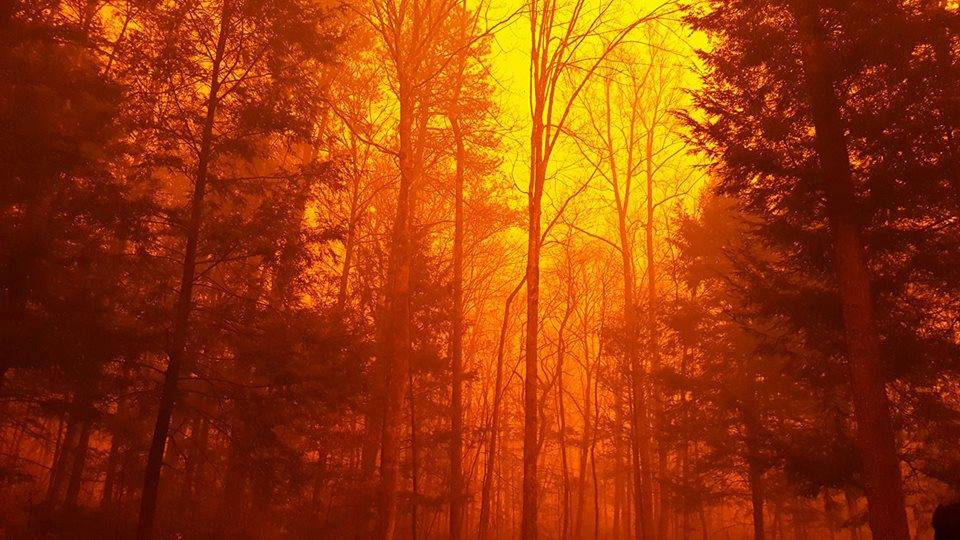We have much more to do and your continued support is needed now more than ever.
Tennessee Wildfires Devastate Communities, Threaten Wildlife

UPDATE, 12/16: Officials declared all fires out as of Tuesday, December 13. After 15 days of fires, it was confirmed that 14 people have died and 191 others were injured from the wildfires. The state received assistance from the National Guard and donations are flowing to the area for those affected by the fire.
Wildfires in Tennessee have now killed three people and injured 14 others, and caused untold damage to wildlife and natural resources. As the fires continue to rage out of control, they’re raising questions about whether we’re doing enough to prepare for worsening wildfires in a warming world.
“Over 150 structures in the county have been damaged or destroyed. 70 homes in Wears Valley, 70 homes Cobbly Nob,” reports WVLT’s Casey Wheeless.
[youtube]https://www.youtube.com/watch?v=So1ZnTtfH04[/youtube]
It’s estimated over 500 acres of national park lands have been burned. The National Park Service has announced that “Great Smoky Mountains National Park officials have closed all facilities in the park due to the extensive fire activity, and downed trees.”
Fortunately, reports indicate the Ripley Aquarium escaped damage and bald eagles from the Eagle Mountain Sanctuary were successfully evacuated. But wildfires pose a variety of threats to wildlife, fish and birds and the damage will take weeks to total.
“The Great Smoky Mountains are one of the most biologically diverse places in the United States, partly due to the geologically ancient nature of the landscape, as well as the wet and humid forests covering their slopes and hollows,” says Bruce Stein, associate vice president for conservation science & climate adaptation at the National Wildlife Federation. “While fire is a natural phenomenon in Appalachian forests, these extreme, drought-fueled fires are not. Rather, they are a glimpse into what many southeastern forests and communities will experience as climate change continues to intensify.”
The New York Times connects the dots from the wildfires to global warming:
The fires spread through Tennessee as much of the South has been enduring a crippling drought, even though rainfall this week offered some relief. The United States Drought Monitor reported last week that 60 percent of Tennessee was in “exceptional” or “extreme” drought, the two most severe ratings. […]
Wildfires, once a seasonal phenomenon, have become a consistent threat, partly because climate change has resulted in drier winters and warmer springs, which combine to pull moisture off the ground and into the air.
In January, Tom Vilsack, the United States agriculture secretary noted the increasing frequency of wildfires in the United States in 2015.
“We take our job to protect the public seriously, and recently, the job has become increasingly difficult due to the effects of climate change, chronic droughts and a constrained budget environment in Washington,” he said.
Laura Potts is the National Wildlife Federation’s social media manager and a Tennessee native. Here’s her reaction to the fires:
As a native east Tennessean, I tear up with every news update and Facebook post from friends and family scrambling to help the humans and animals affected by the wildfires. The Great Smoky Mountain National Park is the pride of the area, with more annual visitors than any other park in the country. Those mountains, rivers, wildlife, and history have a way of transporting each of us to a simpler time. They slow us down, take our breath away, and remind us of what’s truly important. Sharing our mountains with the world is what made Gatlinburg the tourist area it is now. And watching those cherished areas be destroyed is heartbreaking. But I know first-hand that Tennesseans are resilient, positive, “volunteering” people who will come back and build better than ever.
Wildfires have hit home time and time again in recent years across the NWF family, from Tennessee to California to Colorado.
As the threat of wildfires grow across America, the need to fight climate change becomes even clearer. It’s critical that our members of Congress act now to protect our communities and natural resources from the worsening impacts of climate change.
Take Action to Protect Wildlife





















